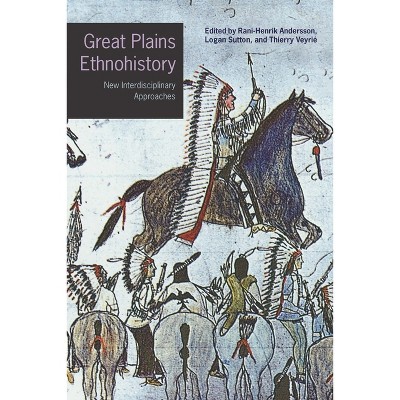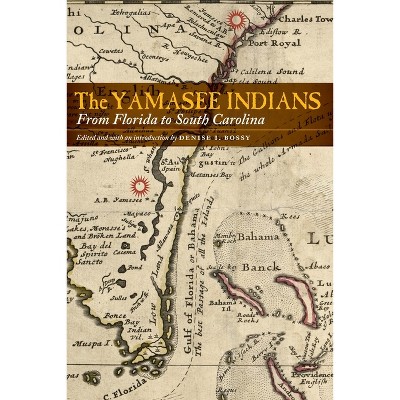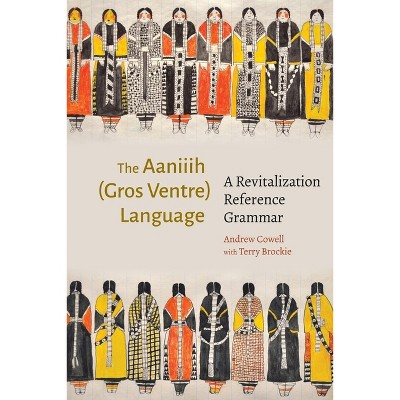Sponsored

We Are Not Animals - by Martin Rizzo-Martinez
$40.00
In Stock
Eligible for registries and wish lists
Sponsored
About this item
Highlights
- Winner of the 2023 John C. Ewers Award Named a 2023 Choice Outstanding Academic Title By examining historical records and drawing on oral histories and the work of anthropologists, archaeologists, ecologists, and psychologists, We Are Not Animals sets out to answer questions regarding who the Indigenous people in the Santa Cruz region were and how they survived through the nineteenth century.
- About the Author: Martin Rizzo-Martinez is an assistant professor in the Film and Digital Media Department at the University of California, Santa Cruz.
- 538 Pages
- Social Science, Ethnic Studies
Description
About the Book
We Are Not Animals traces the history of Indigenous people in the Santa Cruz area through the nineteenth century, examining the influence of Native political, social, and cultural values and these people's varied survival strategies in response to colonial encounters.Book Synopsis
Winner of the 2023 John C. Ewers AwardNamed a 2023 Choice Outstanding Academic Title By examining historical records and drawing on oral histories and the work of anthropologists, archaeologists, ecologists, and psychologists, We Are Not Animals sets out to answer questions regarding who the Indigenous people in the Santa Cruz region were and how they survived through the nineteenth century. Between 1770 and 1900 the linguistically and culturally diverse Ohlone and Yokuts tribes adapted to and expressed themselves politically and culturally through three distinct colonial encounters with Spain, Mexico, and the United States. In We Are Not Animals Martin Rizzo-Martinez traces tribal, familial, and kinship networks through the missions' chancery registry records to reveal stories of individuals and families and shows how ethnic and tribal differences and politics shaped strategies of survival within the diverse population that came to live at Mission Santa Cruz. We Are Not Animals illuminates the stories of Indigenous individuals and families to reveal how Indigenous politics informed each of their choices within a context of immense loss and violent disruption.
Review Quotes
"We Are Not Animals is an important book in California mission studies, deploying established sources and a significant, frequently overlooked one--Confirmation records--to reveal Indian community building inside the mission to which Franciscans were oblivious. Rizzo-Martinez effectively demonstrates how Indians exploited the mission system for their own ends and carries the story through early California statehood, challenging previous interpretations that missionization had extinguished Indian culture. We Are Not Animals marks the arrival of a sophisticated scholar to the conversations about early California history."--James A. Sandos, Farquhar Professor of the American Southwest, Emeritus, University of Redlands
"We Are Not Animals stands as a definitive study of Indigenous people in the Santa Cruz region and the survival of Indigenous people in California."--William J. Bauer, Jr., American Historical Review
"Rizzo-Martinez unearths Native voices from the archive to provide an overdue historical account of the Indigenous experience in Santa Cruz and surrounding region. By decentering colonial institutions like the missions and non-Native voices, Rizzo-Martinez effectively places Indigenous space and knowledge at the center of this study, a valuable model for future scholars of the Native experience in California."--Yve Chavez (Tongva), assistant professor of history of art and visual culture at the University of California, Santa Cruz
"We Are Not Animals contains a story that is widely known to California historians but is seldom told with this much attention to Native people's choices and voices. . . . The book's careful excavation of Native women's lives is its strongest feature, providing much-needed attention to Indigenous women's involvement in politics, labor systems, and resistance movements."--Joshua Paddison, Western Historical Quarterly
"Rizzo-Martinez confines his study to Mission Santa Cruz, but his story has broader relevance. . . . His effort to identify Native voices and motives in colonial sources is not only fitting for a book on the history of Native people but also imperative for understanding a colonial institution where Native people were always in the majority. Beyond its contributions to mission historiography, in its emphasis on internally dynamic and adaptive Native politics, Rizzo-Martinez's work bridges the era of Spanish colonization with the later nineteenth century and offers a useful interpretive model for future scholarship on Native survival into the twentieth century."--Khal Schneider, Native American and Indigenous Studies
"Deeply researched and fresh in conception, methodology, and breadth, We Are Not Animals is a major contribution to the study of Native California and the missions. . . . In a singular and exceptional way among historians, Martin Rizzo-Martinez identifies Native people by name, family, and tribe, and he follows the survivors of the Amah Mutsun nation through the American genocide of the late nineteenth century."--Lisbeth Haas, professor emeritus of history at the University of California, Santa Cruz
"Throughout this book, Martinez demonstrates the agency of the Native tribes in California from showcasing their survivance to noting how they were able to utilize anthropologists to preserve their histories and oral traditions. The source material is interdisciplinary and draws on the work of anthropologists, archaeologists, ecologists, and psychologists, among other disciplines. With these sources We Are Not Animals highlights individual and family stories, while still telling a collective history. Historically, Indigenous histories and voices have been marginalized in California history. Placing Indigenous people at the center of California history highlights the survivance of Indigenous peoples in the state. Martinez successfully tackles this endeavor through his foundation of oral histories."--Analiesa Delgado, American Indian Quarterly
"We Are Not Animals is a monumental volume exploring the Indigenous contours that shaped the colonial, Mexican, and American periods of Alta California. Hyperfocused on the intricate and continuous lineages, traditional ecological knowledge, and cultures of multiple communities within and around Santa Cruz (home of Mission Santa Cruz), Martin Rizzo nonetheless offers history on an epic scale. . . . There are so many valuable contributions in this text, which will greatly shape mission historiography for years to come, but Rizzo's collaboration with Native communities offers the most lasting and meaningful reason to read his book."--Natale Zappia, California History
"A deeply compelling work on the history of Indigenous people in Santa Cruz County, California. . . . This stunning book will appeal to scholars and lay readers alike."--T. P. Bowman, Choice
"Both heartbreaking and inspiring, We Are Not Animals is a history of destruction as well as of California Indian survival against great odds. Rizzo-Martinez has written a deeply researched study of Indigenous peoples in Santa Cruz and surrounding areas that improves our understanding of Native American experiences in California as a whole."--Benjamin Madley, author of An American Genocide: The United States and the California Indian Catastrophe, 1846-1873
About the Author
Martin Rizzo-Martinez is an assistant professor in the Film and Digital Media Department at the University of California, Santa Cruz.Dimensions (Overall): 9.0 Inches (H) x 6.0 Inches (W) x 1.2 Inches (D)
Weight: 1.72 Pounds
Suggested Age: 22 Years and Up
Number of Pages: 538
Genre: Social Science
Sub-Genre: Ethnic Studies
Publisher: University of Nebraska Press
Theme: Native American Studies
Format: Paperback
Author: Martin Rizzo-Martinez
Language: English
Street Date: May 1, 2024
TCIN: 91633245
UPC: 9781496238757
Item Number (DPCI): 247-37-9890
Origin: Made in the USA or Imported
If the item details aren’t accurate or complete, we want to know about it.
Shipping details
Estimated ship dimensions: 1.2 inches length x 6 inches width x 9 inches height
Estimated ship weight: 1.72 pounds
We regret that this item cannot be shipped to PO Boxes.
This item cannot be shipped to the following locations: American Samoa (see also separate entry under AS), Guam (see also separate entry under GU), Northern Mariana Islands, Puerto Rico (see also separate entry under PR), United States Minor Outlying Islands, Virgin Islands, U.S., APO/FPO
Return details
This item can be returned to any Target store or Target.com.
This item must be returned within 90 days of the date it was purchased in store, shipped, delivered by a Shipt shopper, or made ready for pickup.
See the return policy for complete information.
Frequently bought together

$10.19 - $23.09
MSRP $15.99 - $32.99
Buy 1, get 1 50% off select books
4.6 out of 5 stars with 78 ratings

$15.38
Buy 1, get 1 50% off select books
5 out of 5 stars with 3 ratings

$18.88
MSRP $27.00
Buy 1, get 1 50% off select books
4.8 out of 5 stars with 575 ratings

$15.68
Buy 1, get 1 50% off select books
4.8 out of 5 stars with 204 ratings
Trending Non-Fiction

$15.68
Buy 1, get 1 50% off select books
4.8 out of 5 stars with 204 ratings

Highly rated
$19.31
was $20.98 New lower price
Buy 1, get 1 50% off select books
4 out of 5 stars with 65 ratings

$18.28
was $19.58 New lower price
Buy 1, get 1 50% off select books
4.7 out of 5 stars with 17 ratings

$4.59
MSRP $7.99
Buy 1, get 1 50% off select books
4.8 out of 5 stars with 123 ratings

$6.20
MSRP $10.95
Buy 1, get 1 50% off select books
4.8 out of 5 stars with 33 ratings

$7.09
MSRP $9.99
Buy 1, get 1 50% off select books
4.9 out of 5 stars with 46 ratings







